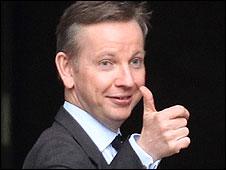Gove is named education secretary
- Published

Michael Gove is to lead the coalition's education team
Michael Gove is to be the education secretary in the Conservative-Liberal Democrat coalition.
Among the coalition's policies will be the "pupil premium" which aims to target extra funding at schools serving disadvantaged pupils.
This was promised by both Conservatives and Liberal Democrats.
There will also be the "free schools" scheme, which would allow parents or other groups to take public money to run schools.
The joint policy statement for schools promises:
that new providers can enter the state school system in response to parental demand
that all schools have greater freedom over curriculum
that all schools are held properly accountable
Under the Conservative-Liberal Democrat government, the ministry will now be known as the Department for Education - changing from the former title of the Department for Children, Schools and Families.
Pledge
David Willetts has been announced as minister of state for education and skills, with responsibility for universities.
The National Union of Students has written to the Deputy Prime Minister Nick Clegg asking him to honour his promise to voters that his party would "block those unfair tuition fees and get them scrapped once and for all".
The coalition agreement says that the Liberal Democrats will be able to abstain if they oppose the findings of the fees review chaired by Lord Browne.
There will be scrutiny of the detail of the incoming government's plans for education - to see how it accommodates the views of the two parties in this coalition.
The free schools policy was criticised heavily during the election campaign by the Liberal Democrats, who argued it would take away funding from other schools.
Mr Clegg, in his capacity as Liberal Democrat leader, described this policy last week as a "disaster for standards".
Funding
In particular there will be questions about the control of free schools.
The advocates of free schools will want to see that schools can be run outside of council control.
Their opponents, who say this is privatisation by the back door, will want new schools to remain under the strategic control of the local authority.
There will also be questions about funding.
The pupil premium proposed by the Liberal Democrats, which aimed to cut class size, depended upon an extra £2.5bn. They said it was not viable without this additional money.
The agreement promises to "fund a significant premium for disadvantaged pupils from outside the schools budget by reductions in spending elsewhere".
This will come from a spending review which will report in the autumn.
Unions
Teachers' unions said they looked forward to working with Mr Gove.
The Association of School and College Leaders said he had demonstrated a clear commitment to education.
General secretary Dr John Dunford said: "Secondary school and college leaders are ready to work with the new government to continue to improve our education system.
"It is only through the commitment and backing of school and colleges leaders that government initiatives succeed, so we urge the new education secretary to work closely with practitioners to ensure that policies are worthwhile, achievable and based in reality."
Christine Blower, general secretary of the National Union of Teachers, said: "While the NUT has had a number of policy differences with the Conservatives, particularly over 'free schools', Michael Gove has always been open to discussion with the union about his plans.
"I will be seeking an early meeting with the Secretary of State in order to establish a constructive working relationship with his department."
Chris Keates, General Secretary of the NASUWT, gave a guarded welcome to Mr Gove.
"Parents and the public made clear their views in the run-up to the election on the importance of local and national government having direct involvement in running schools," she said.
"The NASUWT shares those views."
And General secretary of the Association of Teachers and Lecturers, Dr Mary Bousted, said: "We hope education ministers see the virtues of continuing the social partnership, which has worked well for the government, schools and pupils.
"And we hope the new education department will resist any funding cuts which will make it harder for schools and education staff to keep improving standards."
Tuition fees
The university think tank, Million Plus, raised concerns about tuition fees for students being increased under the coalition.
Chief executive Pam Tatlow said: "The Liberal Democrats made a clear election pledge that tuition fees for full-time and part-time students would be abolished.
"Liberal Democrat MPs and voters may well be disappointed that this has been scrapped as part of the coalition negotiations.
"However, the coalition agreement that the Liberal Democrats should abstain on any proposals tabled in the House of Commons following Lord Browne's review of fees which they dislike, would deliver a Conservative majority for tuition fee and university funding reform."
- Published12 May 2010
- Published10 May 2010